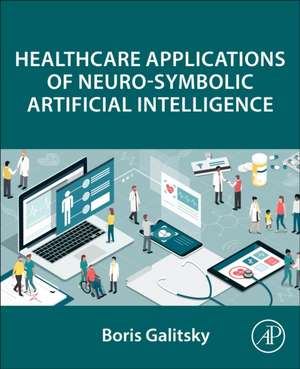Healthcare Applications of Neuro-Symbolic Artificial Intelligence
Autor Boris Galitskyen Limba Engleză Paperback – aug 2025
This book will be a welcomed resource for researchers and graduate students in artificial intelligence, natural language processing, and biomedical informatics, as well as professionals in software development who are looking to redesign current systems to leverage LLM through the health application of neuro-symbolic architecture.
- Presents a comprehensive introduction to the field of neuro-symbolic AI in health, explaining hybrid architectures and reasoning techniques
- Provides hands-on training in navigating deep learning resources and APIs, including HuggingFace and GitHub, as well as reasoning systems like Prolog
- Describes buildable, scalable neuro-symbolic systems that can perform search, recommendation, content writing, diagnosis, treatment planning, and educational support
Preț: 1092.99 lei
Preț vechi: 1366.24 lei
-20% Nou
Puncte Express: 1639
Preț estimativ în valută:
209.13€ • 219.53$ • 173.59£
209.13€ • 219.53$ • 173.59£
Carte nepublicată încă
Doresc să fiu notificat când acest titlu va fi disponibil:
Se trimite...
Preluare comenzi: 021 569.72.76
Specificații
ISBN-13: 9780443300462
ISBN-10: 0443300461
Pagini: 300
Dimensiuni: 191 x 235 mm
Editura: ELSEVIER SCIENCE
ISBN-10: 0443300461
Pagini: 300
Dimensiuni: 191 x 235 mm
Editura: ELSEVIER SCIENCE
Cuprins
1. Neuro-Symbolic Shaped-Charge Learning Architecture
2. Health Applications of Shaped-Charge Learning
3. Enabling LLM with plug-and-play symbolic reasoning components
4. Extending LLM capabilities beyond reasoning (Boris Galitsky and Alexander Rybalov)
5. Differential Diagnose-making with LLM and Probabilistic Logic Program
6. LLM-based Personalized Recommendations in Health
7. Leveraging Medical Discourse to Answer Complex Questions
8. Identifying LLM Hallucinations in Health Communication
9. Enabling LLMs with explainability
10. Explainability Discourse
11. Enabling Retrieval-Augmented Generation and Knowledge Graphs with Discourse Analysis
12. Employing LLM to solve Constraint Satisfaction
13. Kolmogorov-Arnold Network for Word-Level Explainable Meaning Representation
14. Conclusions
2. Health Applications of Shaped-Charge Learning
3. Enabling LLM with plug-and-play symbolic reasoning components
4. Extending LLM capabilities beyond reasoning (Boris Galitsky and Alexander Rybalov)
5. Differential Diagnose-making with LLM and Probabilistic Logic Program
6. LLM-based Personalized Recommendations in Health
7. Leveraging Medical Discourse to Answer Complex Questions
8. Identifying LLM Hallucinations in Health Communication
9. Enabling LLMs with explainability
10. Explainability Discourse
11. Enabling Retrieval-Augmented Generation and Knowledge Graphs with Discourse Analysis
12. Employing LLM to solve Constraint Satisfaction
13. Kolmogorov-Arnold Network for Word-Level Explainable Meaning Representation
14. Conclusions
